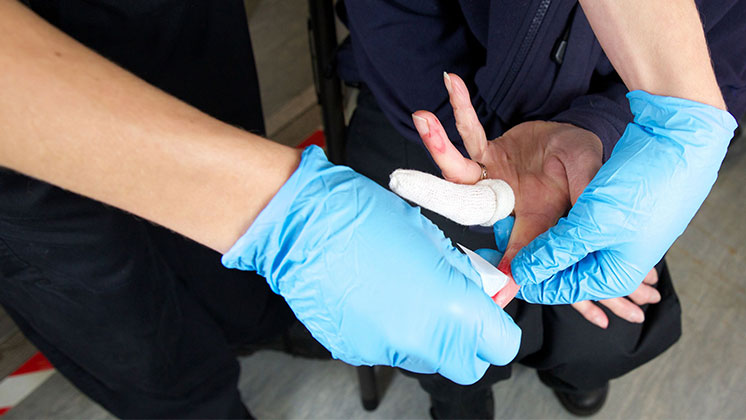Workers Comp Finger Injury Settlements in Virginia

Some of the most common injuries in workplaces are those to the hands, fingers, or wrists. Many Virginia workers ask, “Can I claim worker’s compensation for a finger injury? How much worker’s comp could I get for my hand?” Under the Virginia Workers’ Compensation Act, workers who injured their hand or finger on the job are generally entitled to workers’ comp. If you need legal help for your specific case, please get in touch with our trusted worker’s comp attorney Jaleh Slominski for a free consultation.
What Hand or Finger Injuries Qualify for Workers’ Comp in Virginia?
Here are some examples of hand, wrist, and finger injuries that may be eligible for worker’s compensation:
- Fractures (broken bones)
- Twisted or jammed finger
- Dislocated finger
- Sprained wrist
- Burn injuries
- Cuts or lacerations
- Penetrating injury (when something pierces the limb)
- Carpal tunnel syndrome
- Nerve damage
- Amputation of finger or hand.
To be compensable under the Virginia worker’s compensation law, a worker’s injury must have occurred while performing work duties and because of the nature of the work. For instance, if a machine operator broke his fingers, he must show that the accident occurred due to his work and not just an ‘ordinary’ incident that could happen to anyone anywhere.
Proving this can be challenging, especially for gradual or less urgent injuries like carpal tunnel syndrome. Don’t hesitate to call us at Slominski Law for skilled legal support in proving your claim.
How Much is the Worker’s Compensation for Hand or Finger Injuries in VA?
Virginia workers’ comp covers both medical care and lost wages benefits. Each case is unique, and settlement amounts vary.
Covered medical expenses may include diagnostic tests (such as X-ray), medication, pain management, therapy, surgery, and prosthetics. Projected future costs can also be included, such as treatment for chronic pain or the anticipated need for prosthetic replacements. Work with an experienced worker’s comp lawyer to thoroughly assess and maximize the value of your medical claim.
Meanwhile, wage loss benefits in Virginia compensate you if your injury turns into an impairment or disability that prevents you from returning to your pre-injury work. This benefit applies only if your disability lasts for more than seven days; the payment begins on the eighth day. Here’s how much wage replacement you may receive, and for how long:
Temporary partial disability (TPD)
If your doctor clears you for work on a limited capacity, you’ll receive two-thirds of the difference between your pre-injury weekly wages and your post-injury weekly wages.
For example, let’s say you earned $500 a week prior to your injury, but only $200 a week after you got injured. The difference is $300, and two-thirds of that is $200. Thus, you’ll get a weekly payment of $200 until you’re able to go back to full-duty work.
Temporary total disability (TTD)
If your injury prevents you from working altogether (even from light-duty work), this may be considered total disability. Wage loss compensation for this is two-thirds of your average weekly wages. If, for example, your average weekly earning was $900, two-thirds of that is $600. That’s the amount you’ll receive weekly until you’re cleared to work again.
Permanent partial disability (PPD)
This means you have permanently lost the use of a body part, such as if your finger or hand had to be amputated. The wage benefit amount for this is also two-thirds of your average weekly wages, but the compensation period depends on which body part is disabled, as per Virginia Code 65.2-503:
- Thumb – 60 weeks
- First finger/Index finger – 35 weeks
- Second finger – 30 weeks
- Third finger – 20 weeks
- Fourth finger/Little finger – 15 weeks
- First phalanx (bone) of any finger – half the period set of that respective finger
- If more than one phalanx is disabled, the compensation period is the same as if the entire finger is disabled.
- Hand – 150 weeks
- Arm – 200 weeks.
“Compensation period” refers to the duration of weekly payments or the number of compensable weeks. If you choose to receive a settlement instead of weekly worker’s comp payments, your settlement may pay all the compensable weeks in a one-time lump sum. There are advantages and disadvantages to this, so it’s best to consult with our knowledgeable attorney on the best option for you.
What is the Average Workers’ Comp Settlement for Hand Injury?
As you can see above, there are many factors that go into calculating a worker’s comp settlement. Some estimates say that on average, a hand injury could get a settlement of $15,000 to $35,000 if you are able to return to full-duty work. If your hand injury is permanent, the estimated average settlement ranges from $55,000 to $85,000.
Remember that these are only general estimates – your settlement amount could be much different depending on the circumstances of your case.
What is the Average Worker’s Comp Settlement for Wrist Injury?
There’s a wide variety of job-related wrist injuries, with different severities and outcomes for the worker. Injuries range from torn ligaments (sprains) that can heal with medication, to broken wrists that require surgery and therapy. The settlement for carpal tunnel syndrome, for instance, may range from $30,000 to $70,000.
Again, each case is unique. For example, do you have a pre-existing condition that might have been impacted by your present injury? For the most reliable assessment of the value of your worker’s comp case, speak with a worker’s compensation attorney.
Talk to a Slominski Law, Trusted Virginia Workers’ Comp Lawyer
Virginians have trusted Attorney Jaleh K. Slominski for over 25 years for her excellent handling of workers’ comp claims. With her extensive experience and strategic legal know-how, Ms. Slominski has maximized the settlements of injured Virginia workers, including those with injured hands, wrists, or fingers.
Talk to Attorney Slominski about your work injury. Call (434) 384-9400 in Lynchburg or (540) 554-3762 in Roanoke to get your consultation.





